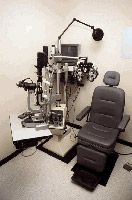Routine Eye Exams
The Importance of Having Routine Eye Exams
Many of us don’t get our eyes examined regularly if we are not experiencing obvious problems. However, many blinding eye diseases have few or no warning signs until they have taken away some or all of our vision—at which point it can be too late. Finding eye diseases as early as possible gives you the best chance of saving your sight. And that’s where yearly eye exams come in. The only way to make sure your eyes are as healthy as you think they are is to have your doctor confirm it.
Top Reasons To Have An Eye Exam:
- 1. To Maintain Normal Vision
- Checking your prescription on a regular basis ensures that you are seeing as clearly as you can be. Your eyesight affects everything you do, including driving, studying, working, and playing. Maintaining proper eyesight enhances your quality of life. Once your vision is lost, it is not always restorable.
- 2. For Overall Well-being
- Do you suffer from frequent headaches or fatigue? The solution could be as simple as changing your prescription. Do you spend hours each day working on a computer? If you experience trouble focusing, burning or tired eyes, blurred or double vision, or sensitivity to light, you may have computer vision syndrome (CVS), which can be treated with specially designed eyeglasses. Uncorrected vision problems often lead to learning and reading problems in children. They can cause permanent vision loss and even factor into more significant medical problems such as dyslexia and ADD.
- 3. To Detect Eye Disease
- Early detection is the key to healthy vision, since many serious eye diseases often have no symptoms. Regular eye exams allow your doctor to monitor your vision and help prevent possible blindness.
- 4. To Uncover Hidden Diseases
- There’s a reason they say the eyes are the windows to the soul. Experts suggest that regular eye exams can aid in early detection of diseases such as high blood pressure, multiple sclerosis, diabetes, strokes, kidney problems, brain tumors, and other general health conditions.
- A routine exam includes a thorough evaluation of your eye health and vision quality using state-of-the-art technology. During your appointment, your doctor will discuss relevant health history and any current symptoms, and perform the following tests:
- ◦Determination of refractive errors (e.g., near sightedness, far sightedness, astigmatism) and the corrective prescription
- ◦Eye pressure test for glaucoma
- ◦Binocular Indirect Ophthalmoscopy (a comprehensive analysis of the back of your eye).
- These are simple, painless tests that do not require dilation in all cases. Please call ahead to find out if dilation is necessary.
Routine Eye Care for Children
Regular eye exams are especially important for children, who usually do not tell us when they are having a difficult time seeing up-close to read, or seeing things in the distance. Children often do not realize there is a problem. A periodic comprehensive eye exam can identify problems, and correct the child's vision. Common visual problems in children include amblyopia ("lazy eye") and strabismus ("crossed eyes"). If detected early, both conditions can be corrected.
The recommended guidelines for when to have your eyes examined by an eye care doctor are as follows:
•Ages 0-2: screening during regular pediatric appointments
•Ages 3-5: screening every 1 to 2 years during regular primary care appointments; one exam by an eye doctor before starting kindergarten
•Ages 6-19: examination every 1-2 years or as needed
•Ages 20-29: at least one examination or as needed
•Ages 30-39: at least two examinations or as needed
•Ages 40-65: examination every 2 to 4 years, at least
•Ages 65 and over: examination every 1 to 2 years, at least
If a person has any of the following risk factors, more frequent visits may be necessary:
•History of eye injury
•Diabetes
•Family history of eye problems
•African American over age 40


